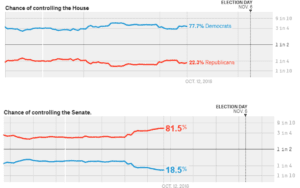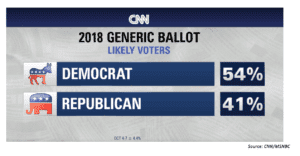The Kavanaugh Question
October 15, 2018
Although Justice Brett Kavanaugh’s appointment was ultimately successful, the question remains of whether or not it will be an instance of winning the battle but losing the war with regard to the 2018 midterm elections.
Some commentators have suggested that had Justice Kavanaugh’s confirmation failed, it might have sparked a backlash among voters in both parties who did not see the accusations against him as credible or did not believe the handling of those allegations was fair. Some commentators have also argued that despite Justice Kavanaugh’s successful confirmation, such a backlash could still be in play and could compromise Democrats’ gains in the midterms.
On the other hand, some observers have suggested that Democrats’ anger over Justice Kavanaugh’s confirmation could be the very thing that galvanizes voters to choose Democratic candidates and leads to an even larger “Blue Wave.”

Recent polls have shown an overall decline in the margin for Democrats, coinciding almost exactly with the start of the Kavanaugh hearings. In terms of the likelihood of retaking the two chambers of Congress, Democrats have seen an overall decline of 2-3 percent for the House of Representatives and 13-14 percent for the Senate. However, according to FiveThirtyEight.com, Democrats still maintain a 77.7 percent chance of retaking the House. The party’s chance of retaking the Senate, which most observers believed to be a long shot to begin with, is 18.5 percent.

However, a CNN poll conducted after the hearings and completed immediately following Justice Kavanaugh’s confirmation showed Democrats with a 13 percent lead over Republicans among likely voters on a generic ballot.
Many questions still surround the midterms and the effects of the Kavanaugh hearings. Will Democrats’ anger fuel bigger turnout for the midterms? Has there in fact been a decline in support for Democrats? If so, is it a backlash to the Kavanaugh hearings or is it an example of voters “coming home” as Election Day draws closer?
Discussion and Exploration Questions
- Ask students to research how their senators voted on Justice Kavanaugh’s confirmation and what explanation, if any, the senators gave for their choices. Hold a discussion or a debate on whether students agree or disagree with the reasoning of their senators.
- Ask students to research how their senators voted on Justice Kavanaugh’s confirmation and whether or not one of their senators is up for reelection in 2018. If one of their senators is up for reelection, students should research how he/she and his/her opponents have discussed the Kavanaugh hearings. Can they find areas where decisions may have been politically motivated? How have constituents responded to the senator’s statements on the hearings?
- Justice Kavanaugh was confirmed with a 50-48 vote that largely followed party lines, with the exception of Senator Lisa Murkowski, R-Alaska, voting “present” (not “yes” or “no”) and Senator Joe Manchin, D-W.Va., voting “yes.” Students should research their choices and motives. Have a discussion about how upcoming elections can affect the decisions of policymakers. Do students think this is a problem or in keeping with the idea of representative government?
- The 50-48 vote in favor of Justice Kavanaugh was the smallest margin of confirmation for a Supreme Court justice in 137 years. (In 1881, Justice Stanley Matthews was confirmed by a vote of 24-23.) What does this say about the state of government? Do students believe people are as divided as the government seems to be? What do they believe is the cause of this partisanship?







